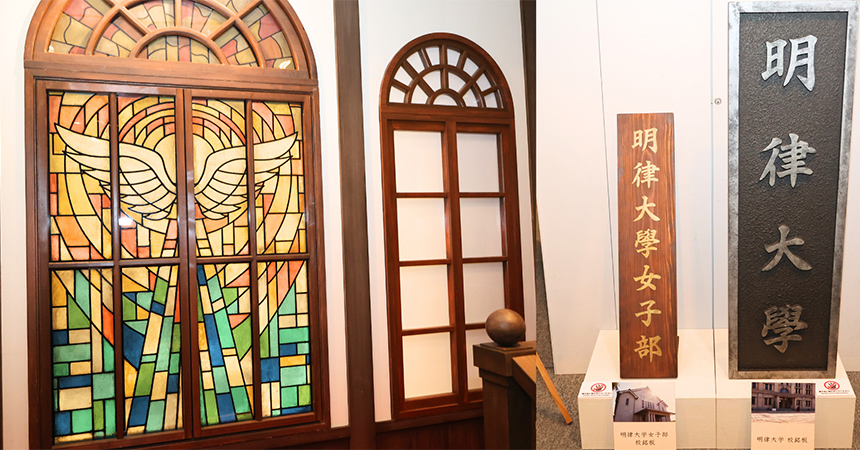
“Tora ni Tsubasa”, NHK serial morning drama, known as “Asadora,” started in April 2024. The drama is an original story based on the true story of Japan’s first female lawyer, MIBUCHI Yoshiko, and is creating a big buzz among viewers. From the fictional name “Meiritsu University” in the drama, it is widely known that the model of the heroine, MIBUCHI Yoshiko, is a graduate of Meiji University.
Coinciding with the airing of the drama, Meiji University Liberty Academy, a hub for lifelong learning, held a free public lecture entitled “Exploring the History of Women’s Education with Japan’s First Female Lawyer, MIBUCHI Yoshiko,” as a special event to celebrate its 25th anniversary, on April 13. Women’s education then and now was introduced through the keynote lecture by Professor MURAKAMI Kazuhiro (Professor at School of Law and Director of the Center for the History of Meiji University), who is in charge of ensuring legal accuracy in “Tora ni Tsubasa”, and the panel discussion by professors and a graduate of Meiji University.
“Tora ni Tsubasa” (adding wings to a tiger) is a proverb that means “making an already strong person or thing even stronger”
The lecture started with a greeting from President UENO Masao, “Thank you for coming to Meiritsu University a.k.a Meiji University.” President UENO, who took office in April, when “Tora ni Tsubasa” started airing, graduated from Meiji University’s School of Law. There is the story of when UENO was a legal apprentice moving on to practical training from the Legal Training and Research Institute of Japan, and YAMAGUCHI Shigeru, the President of the institute then, used the term ““Tora ni Tsubasa”” in his advice during the speech. “Tora ni Tsubasa” (adding wings to a tiger) is a proverb that means “adding more strength to an already strong person or thing,” derived from the words of the Chinese legal philosopher, Han Feizi. President UENO was a little surprised to see the proverb as the drama title.
Looking back on his days as a judge, he said, “Many female legal professionals who graduated from Meiji University are very flexible and unconventional, but still able to look at things considerately. Assuming that such tradition of Meiji University has been cultivated, I would like to thank MIBUCHI-senpai for having started it.”
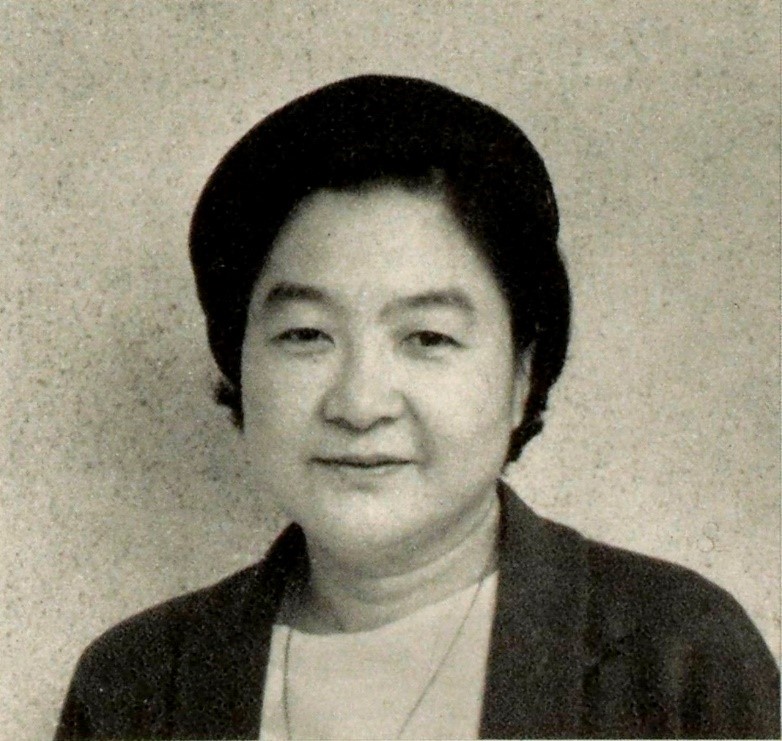
As many as 93 students from all over the country came to the Women’s Department of Law, which was revolutionary!
The first session was a lecture by Professor MURAKAMI. First, he delved into the history of women’s education in Japan.
It was in 1929 (Showa 4) that Meiji University established the Women’s Department as one of the professional departments. 93 students entered the Women’s Department of Law. It was seven years later that a woman entered the Department of Law of Kyushu Imperial University for the first time, which shows how revolutionary the Meiji University Women’s Department was. The President at that time was YOKOTA Hideo, the former Chief Justice of Daishin-in (the former Supreme Court). He was also famous for ruling quite favorably on women as well and for issuing rulings on the fidelity of men.
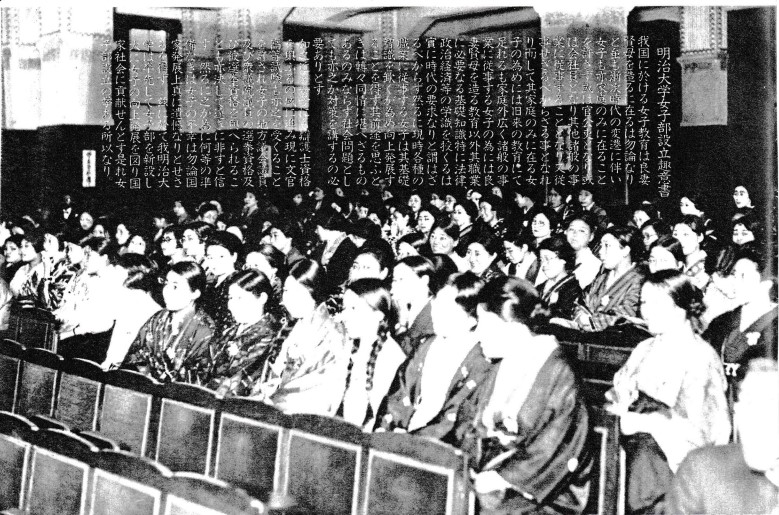
In the application for approval of the Women’s Department of Law filed with the Ministry of Education, Science, Sports and Culture (currently the Ministry of Education, Culture, Sports, Science and Technology), he proclaimed confidently, “The ryosai-kenbo (good wives, wise mothers) education for women is now outdated. Meiji University will put an end to old-fashioned ideas and newly establish the Women’s Department to achieve women’s tremendous growth and progress.” Professor MURAKAMI praised this, saying, “Well said!”
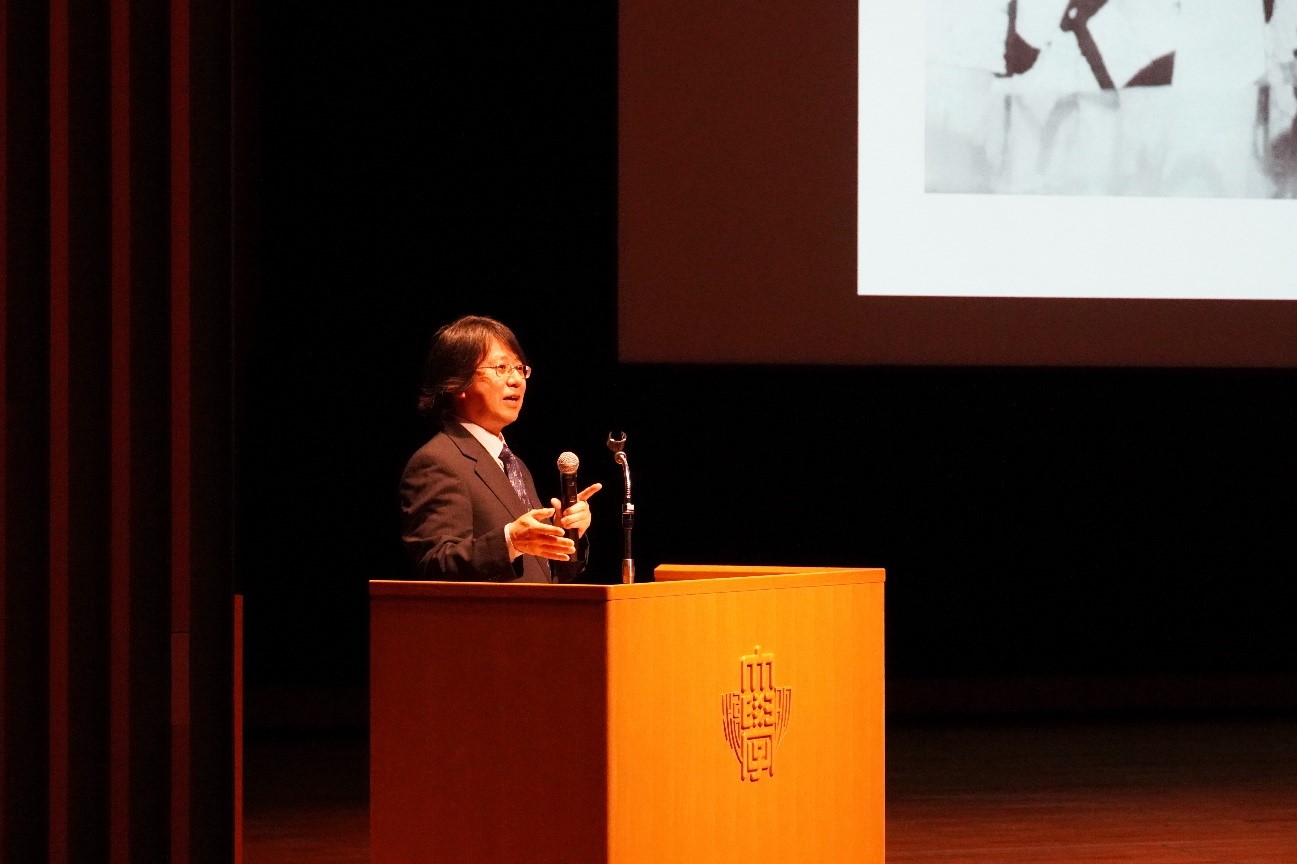
MURAKAMI often receives comments from female teachers that they were in tears, sympathizing with the drama. “I never thought those teachers who have opened their own path would project themselves onto the drama to this extent, so I became painfully aware that misogyny, including emotional wounds, still remains more than I imagined. I hope the drama will be a help, even a little, toward wiping it out.”
Despite the fact that women are not provided opportunities for higher education, you cannot criticize their ability
“Why and how the Women’s Department was established is closely related to the revision of the Attorneys Act,” MURAKAMI said. Before entering school, Tomoko, the heroine of “Tora ni Tsubasa”, was aware of the assumption that “married women are incompetent, so they cannot become a lawyer.” I am sure many people would be shocked at these words.
The qualifications for lawyers had been under debate since the Taisho period. Eventually they went through the Imperial Diet in 1933 with the stipulation, “being an adult as a subject of the Empire,” meaning gender would not be questioned as a qualification to become a lawyer, and they came into effect in 1936. MIBUCHI entered the Women’s Department in 1932. That means that one year later the Attorneys Act was finally revised, and three years later women were allowed to take the exam to be a lawyer. In one scene of the drama, just after Tomoko enters school, her senior says, crying, “The revision of the Attorneys Act has been put off,” which really happened.
Some of the biggest names in the bar association advocated the idea that women were not suitable as lawyers. HOZUMI Shigetoh, a jurist who was a professor at the Women’s Department, strongly objected against it. In the first place, whether a person is suitable for the job or not depends on the nature and talent of each individual, not on gender differences. He stated as follows: Women should not be deprived of equal opportunities in a profession because of their gender. Despite the fact that women are have not provided opportunities for higher education up to now, you cannot criticize their ability. In the drama, HOZUMI is the model of Professor HODAKA Shigechika, played by KOBAYASHI Kaoru. He is such a cool teacher that MURAKAMI said, “I wanted to play that role, too, but I didn’t get it,” provoking laughter.
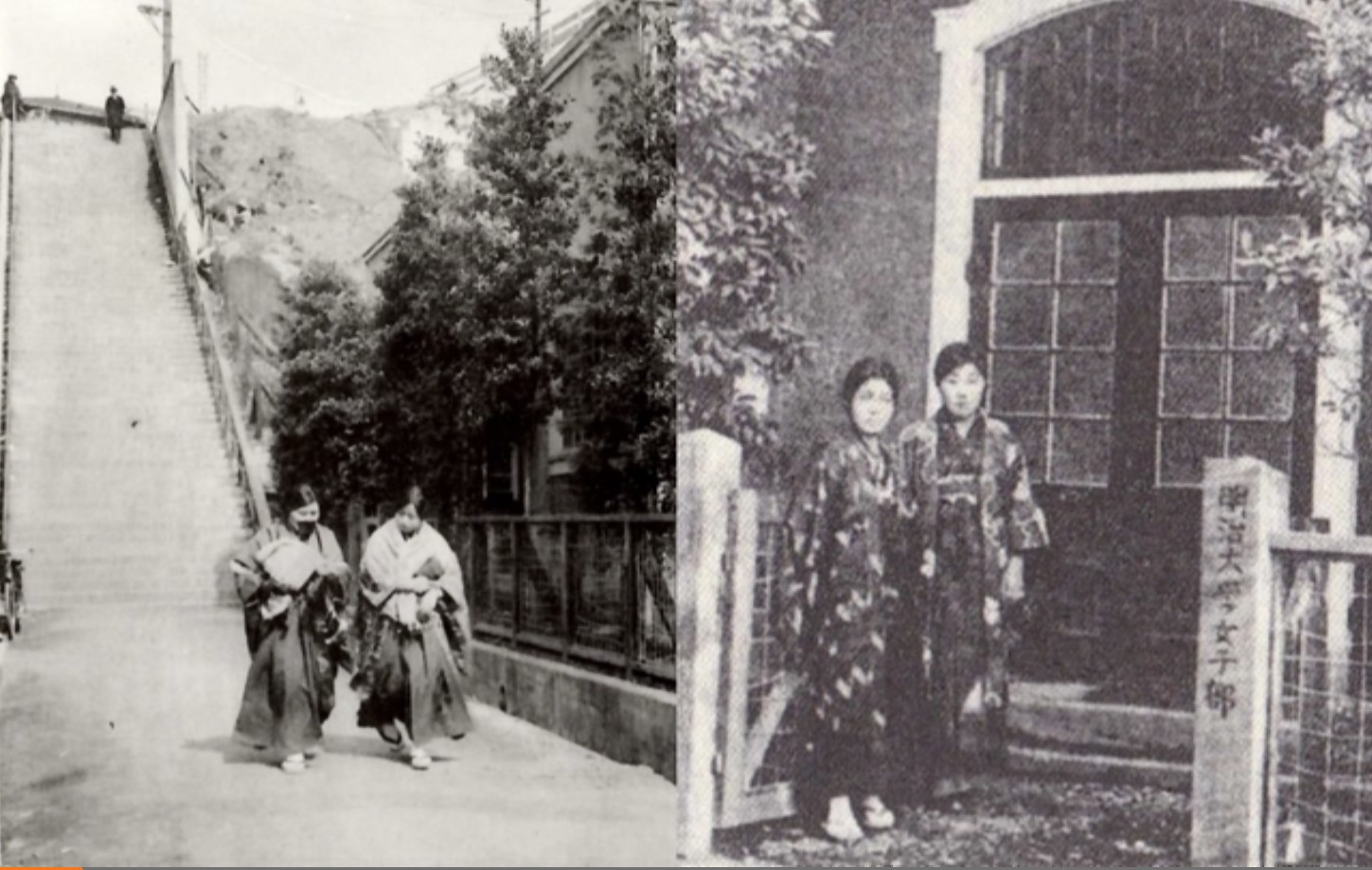
(Left) Otokozaka in Sarugaku-cho Coming down the slope, the school building of the Women’s Department was on the left-hand side.
“I don’t want you to have a sense of elitism”
According to Professor MURAKAMI, 54 students of the first generation of the Women’s Department of Law graduated three years later. Many of the students dropped out for various reasons such as marriage, which was also seen in the drama. After graduation, 15 students went on to the School of Law.
MIBUCHI, a fourth generation student, had 52 classmates when she entered school, but by the time she graduated, the number was halved to 26. The number of students entering the seventh generation in 1935 decreased to 21, and the Women’s Department was in danger of being abolished. However, after the Attorneys Act came into effect, three graduates, including MIBUCHI, passed the examination in 1938. This helped increase the number of female students enrolled and the Women’s Department managed to survive. For your information, it is true that the Women’s Department had foreign students. It was Professor MURAKAMI’s idea that foreign students should appear in the drama.
After the war, up to when the last koutou-shiken (the former examination to be a legal professional) was held in 1948 before the modern bar examination started, 18 women lawyers were created in Japan, and 16 of them were from Meiji University’s Women’s Department. With the promulgation of the Constitution of Japan, the time had come for women to become judges and prosecutors. MIBUCHI became the first female judge, and later, even the first female president of a family court.
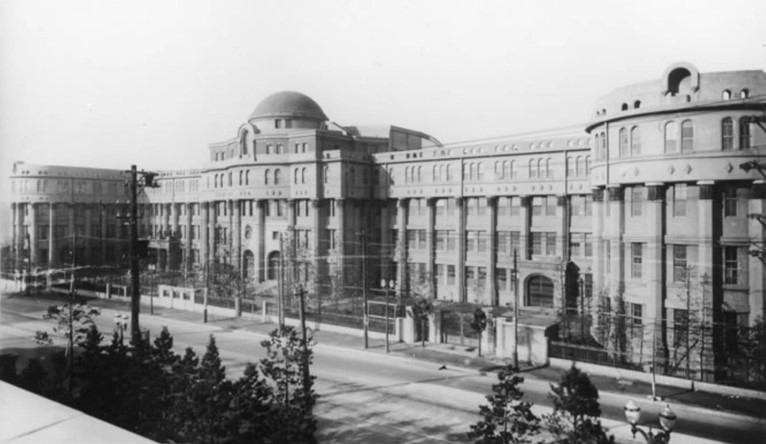
In 1979, at the commemorative lecture of the 50th anniversary of the Women’s Department of Law, MIBUCHI encouraged her juniors with the following messages:
“I don’t want you to have a sense of elitism.”
“I would be very happy if you would continue to carry on this tradition of Meiji University, which is to be independent as a mature person wherever you go.”
“I think that if each woman acquires skills and knowledge to become an independent person, it will raise women’s position in a real sense.”
At the end of his lecture, MURAKAMI said, “Meiji University has produced many women active in many fields, and I think this is what MIBUCHI had also expected.”
There is a problem with the fact that we have to say “women’s education” specifically
In the second session, three other professors joined Professor MURAKAMI on the stage: ABE Rikiya, Dean of the School of Information and Communication, who taught at Meiji University Women’s College, EJIMA Akiko, Professor at the School of Law, and USHIO Naomi, Professor at the School of Information and Communication. SHIRAKAWA Junko, a lawyer at Shin-Kasumigaseki Law Offices, also participated in the panel discussion titled “Exploring the History of Meiji University’s Women’s Education” on behalf of graduates.
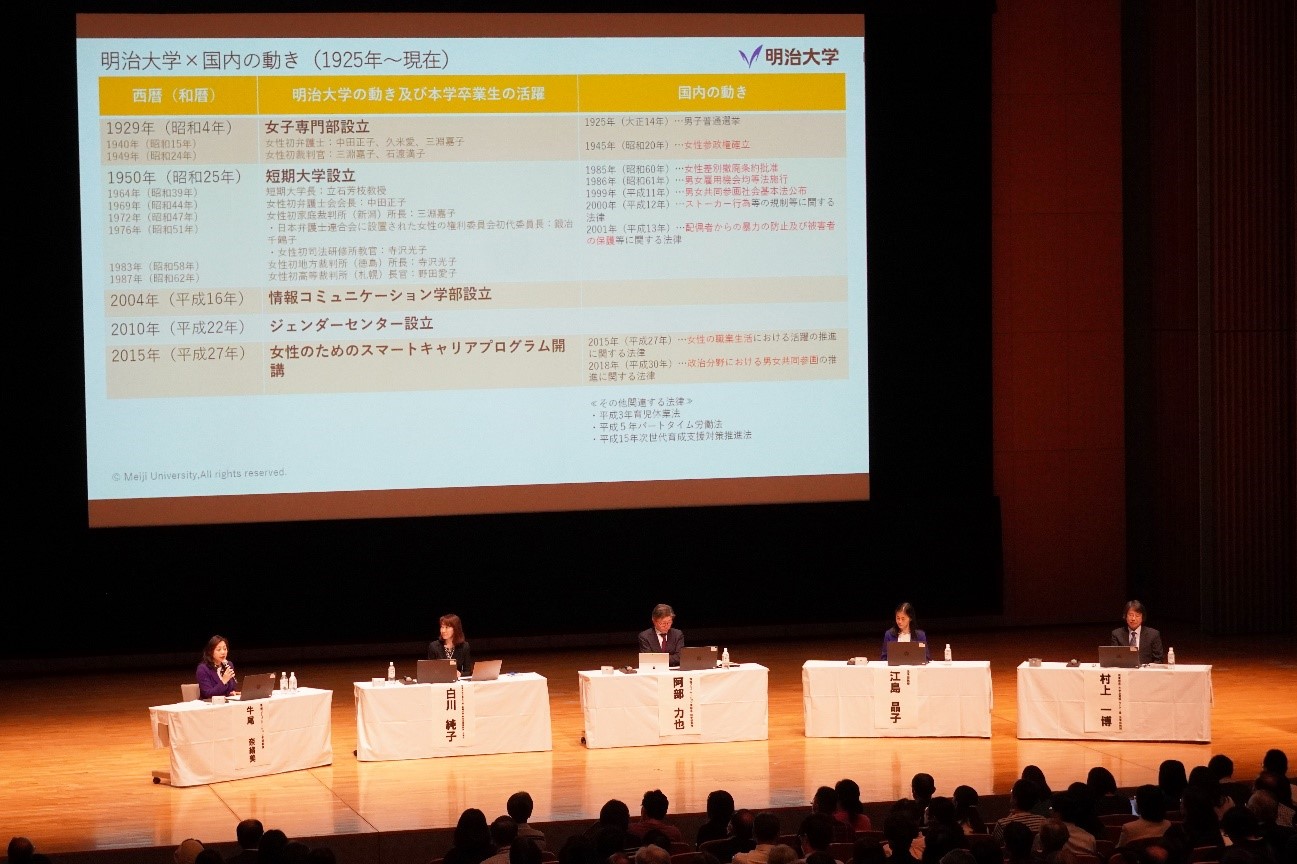
Reviewing reactions to “Tora ni Tsubasa”, MURAKAMI commented, “Even though the law and society have changed, I felt really strongly that women still have many things to deal with and try to break through them.” Professor EJIMA, who started her career at the Women’s College, Meiji University, said, “MIBUCHI’s advice that we should be independent as a mature person, not elitist, is reflected very clearly in Meiji University’s philosophy, ‘individual empowerment.’ Education is to support the wings of those who wish to fly from where they stand now, as a person regardless of gender.” ABE said, “There is a problem with the fact that we have to say ‘women’s education’ specifically. It is desirable to realize a society where gender does not make a difference.”
SHIRAKAWA, who took the bar examination after working at a company, encouraged, “It’s never too late to start studying. I hope you will take a step forward to learn and capture the opportunity to enrich your life.” In response, USHIO said, “From a stay-at-home mom, I learned again and got a job. Education is wonderful. I believe that President UENO now has a stronger determination to devote himself to developing Meiji University further.”
・The exhibition related to “Tora ni Tsubasa” is open at the special exhibition room of the Meiji University Museum, located on the first basement floor of the Academy Common, the venue for the lecture. Costumes and items that were actually used in the drama are on display for free until Monday, October 28, 2024.
https://www.meiji.ac.jp/museum/exhibition/exhibition2024.html
・Liberty Academy, a hub for lifelong learning based at Meiji University, also provides programs for women.
Smart Career Program for Women
https://academy.meiji.jp/mj/career/for-women/
Information noted in the articles and videos, such as positions and affiliations, are current at the time of production.

